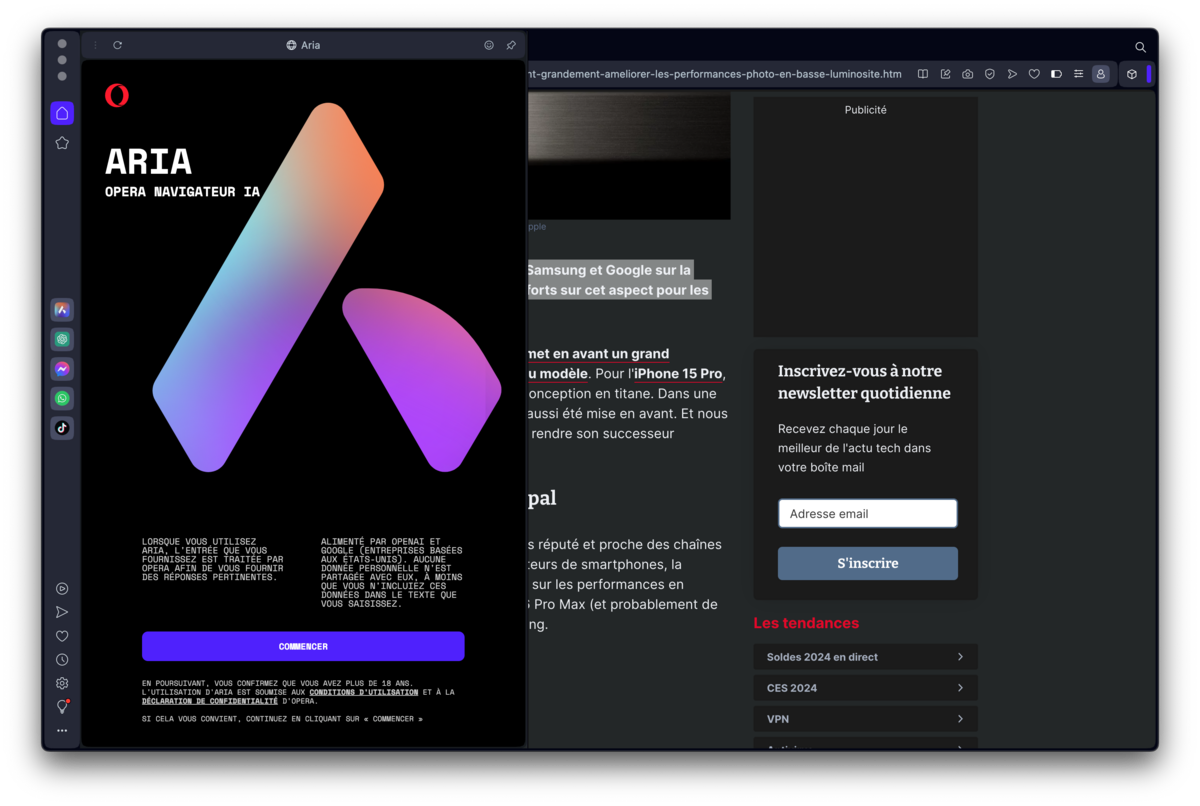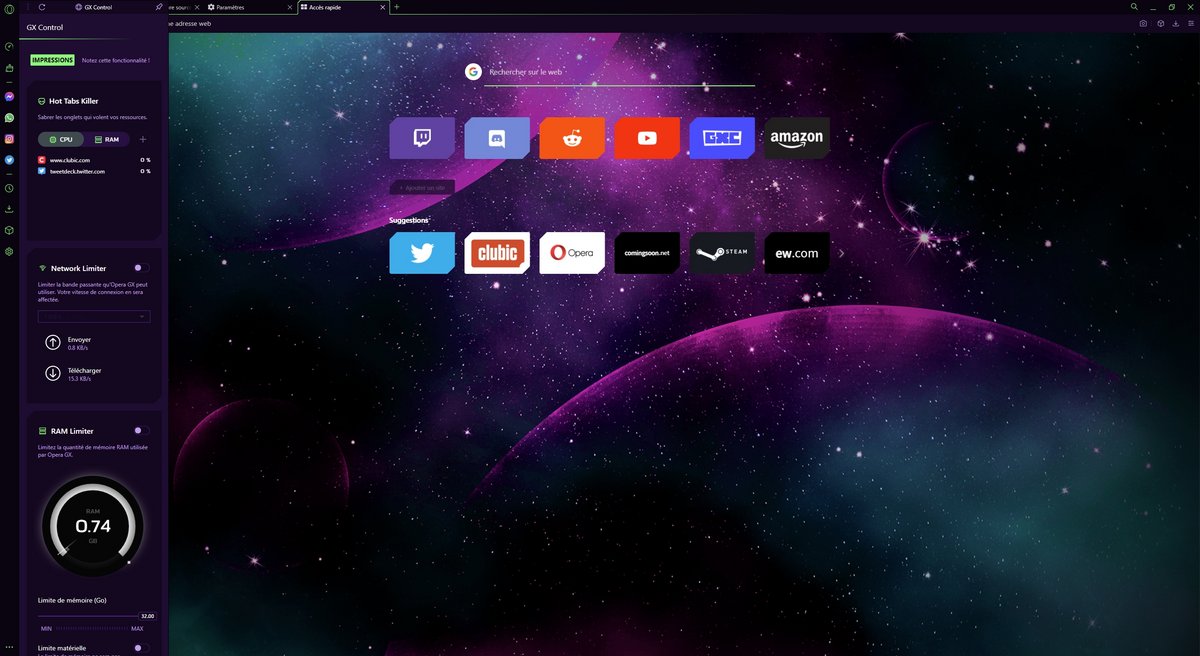Opera is an old browser. Not in the pejorative sense of the term, but quite simply since it is one of the first browsers to have ever existed. Launched in 1996, it has strived to reinvent itself in line with innovations and successive competitors. The latest of these reinventions to date, Opera One is not just a rebranding, but also a new direction for the browser at the dawn of an AI age.
On the occasion of Browser Days in Oslo, Clubic was able to interview Krystian Kolondra, EVP – Executive Vice-President – from Opera. On the program, his vision on the future of the browser and the global market, in the midst of AI fever and the arrival of augmented reality among the general public.
Download
8
- Integration of AI-based features for intelligent navigation
- Intuitive navigation thanks to automatic tab grouping
- A clean, responsive and fully customizable interface
Opera One is the new version of the Opera browser, which was recently launched after a short early access period. This version reinvents the way we interact with our browser by integrating intelligent features and a modular design. This approach allows for smoother navigation by automatically adapting the content of the interface depending on the context.
Opera One is the new version of the Opera browser, which was recently launched after a short early access period. This version reinvents the way we interact with our browser by integrating intelligent features and a modular design. This approach allows for smoother navigation by automatically adapting the content of the interface depending on the context.
What is the trajectory for Opera over the next five years, especially with the emergence, or rather re-emergence of technologies like artificial intelligence, crypto and augmented reality?
Krystian Kolondra: Reflecting on Opera’s journey, it’s quite enlightening to see how our innovations, such as Opera Mini, launched in 2006, have exceeded our initial expectations. Originally it was a necessity for accessing the web in bandwidth-limited environments, and we believed its relevance would diminish as technology advanced. However, it has become clear that adaptability and foresight are key to remaining relevant, as evidenced by the same Opera Mini which currently has over a billion downloads.
Today, we are at a crossroads where ignoring the potential of AI could be detrimental for any technology company. AI isn’t just there to automate tasks; it’s here to improve user experiences, make web navigation more intuitive, and deliver personalized content on an unprecedented scale. As we look toward the integration of Web3 and crypto, it is clear that these technologies will redefine online interactions, making security, privacy, and decentralized control foundations of user experience. Opera is actively exploring these new technologies, ensuring that our browsers not only meet the needs but anticipate the expectations of tomorrow’s users.


My experience with gaming, particularly League of Legends, underscores a universal truth about digital experiences: they are profoundly impacted by the quality and relevance of the technology behind them. As we delve into AI, its ability to act as an enabler of quality of life improvements becomes increasingly evident. This is not restricted to gaming but extends across the digital spectrum, including web browsing. AI’s ability to simplify complex processes, personalize content, and improve security protocols will set new standards for what users expect from their digital platforms.
Simultaneously, the resurgence of crypto, reminiscent of the turbulent evolution of the dotcom era, signals a transformative phase. We envision a future where synergies between AI and blockchain technologies give users unprecedented control and transparency over their online experiences. Opera’s commitment to innovation is evident in our Web3-ready browsers, which exemplify our approach to simplifying the crypto experience through features like the Wallet Switcher, improving the user journey in the digital economy in expansion.
With the advent of niche markets, especially with Opera GX’s focus on gamers, how does Opera plan to navigate these specialized segments?
Krystian Kolondra: Our venture into niche markets, exemplified by Opera GX, shows a broader strategy to meet the unique needs and preferences of specific user communities. This approach is not about exclusion but about creating spaces where users feel that their interests are directly addressed. Opera GX isn’t just a browser; It’s a testament to our belief that web browsing can and should be adapted to improve the user experience, whether through features that optimize performance for gaming or through interfaces that resonate with users’ aesthetic preferences. ‘a player.
This specificity in design and functionality allows us to forge deeper connections with our users, encouraging engagement and loyalty. As we look to the future, our focus will remain on identifying and addressing the needs of diverse user groups, leveraging AI, augmented reality and other emerging technologies to deliver a seamless browsing experience not only functional but also immersive and enjoyable.


As you probably already know, Apple’s Vision Pro augmented reality headset is about to hit the market. How do you envisage the impact of augmented reality on web browsing and Opera’s role in this development?
Krystian Kolondra: The potential for AR to revolutionize web browsing and digital interactions more broadly is immense. Opera is carefully observing these developments, recognizing the need to adapt our browsers to support AR-enriched web experiences. Our vision extends beyond current AR capabilities, anticipating a future where web browsing is not just about viewing content but interacting with it in three-dimensional space. This evolution will require browsers that are not only compatible with AR technologies but also designed to facilitate seamless transitions between real and virtual worlds. Opera’s commitment to innovation positions us well to lead in this space, ensuring that as AR technologies become more accessible, our browsers will offer users new and exciting ways to explore the web.
Looking to the future, what is Opera’s strategic focus to expand its footprint, particularly in France and more broadly in Europe?
Krystian Kolondra: Our objective is clear: growth and innovation. While we have focused on North America and Europe, which remain very important markets for Opera, we are expanding our reach to Latin America, leveraging diversified marketing strategies to introduce our products to new audiences . By engaging with creators, influencers and leveraging platforms like GX, we not only promote our browsers but also enrich the web experience. Opera is positioned at the forefront of fun and innovative web browsing, ready to embrace and shape the future of digital interaction.
Download
8
- Integration of AI-based features for intelligent navigation
- Intuitive navigation thanks to automatic tab grouping
- A clean, responsive and fully customizable interface
Opera One is the new version of the Opera browser, which was recently launched after a short early access period. This version reinvents the way we interact with our browser by integrating intelligent features and a modular design. This approach allows for smoother navigation by automatically adapting the content of the interface depending on the context.
Opera One is the new version of the Opera browser, which was recently launched after a short early access period. This version reinvents the way we interact with our browser by integrating intelligent features and a modular design. This approach allows for smoother navigation by automatically adapting the content of the interface depending on the context.




0